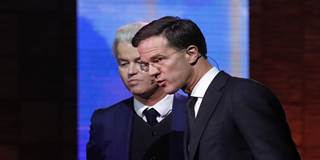Europe’s Dutch Turning Point?
Last week, Dutch voters dealt a blow to far-right populism in their country’s general election. With the Euroskeptic, anti-immigration Party for Freedom, led by Geert Wilders, having managed to secure substantially fewer seats than anticipated, the Dutch outcome is a promising start to a year of critical elections in Europe.
TILBURG – Last week, Dutch voters dealt a blow to far-right populism in their country’s general election. With the Euroskeptic, anti-immigration Party for Freedom (PVV), led by Geert Wilders, having managed to secure substantially fewer seats than anticipated, the Dutch outcome is a promising start to a year of critical elections in Europe.
The Netherlands will now be led by a moderate center-right coalition comprising the conservative-liberal People’s Party for Freedom and Democracy (VVD), the Christian Democratic Appeal (CDA), and the social-liberal Democrats 66 (D66). Smaller Christian parties – or, less likely, the leftist Greens – will probably round out the coalition. Mark Rutte, the VVD leader, is likely to remain as Prime Minister.
The affirmation of political moderation will be good for the Netherlands – and for Europe. The new Dutch government is likely to continue to pursue important structural reforms, including a long-overdue overhaul of the Netherlands’ convoluted tax system. The best approach to such reform may be to introduce a flat income-tax rate and to eliminate the complex tax-credit system, thereby making the system more transparent and efficient, while laying the groundwork for faster long-term economic growth.



TILBURG – Last week, Dutch voters dealt a blow to far-right populism in their country’s general election. With the Euroskeptic, anti-immigration Party for Freedom (PVV), led by Geert Wilders, having managed to secure substantially fewer seats than anticipated, the Dutch outcome is a promising start to a year of critical elections in Europe.
The Netherlands will now be led by a moderate center-right coalition comprising the conservative-liberal People’s Party for Freedom and Democracy (VVD), the Christian Democratic Appeal (CDA), and the social-liberal Democrats 66 (D66). Smaller Christian parties – or, less likely, the leftist Greens – will probably round out the coalition. Mark Rutte, the VVD leader, is likely to remain as Prime Minister.
The affirmation of political moderation will be good for the Netherlands – and for Europe. The new Dutch government is likely to continue to pursue important structural reforms, including a long-overdue overhaul of the Netherlands’ convoluted tax system. The best approach to such reform may be to introduce a flat income-tax rate and to eliminate the complex tax-credit system, thereby making the system more transparent and efficient, while laying the groundwork for faster long-term economic growth.